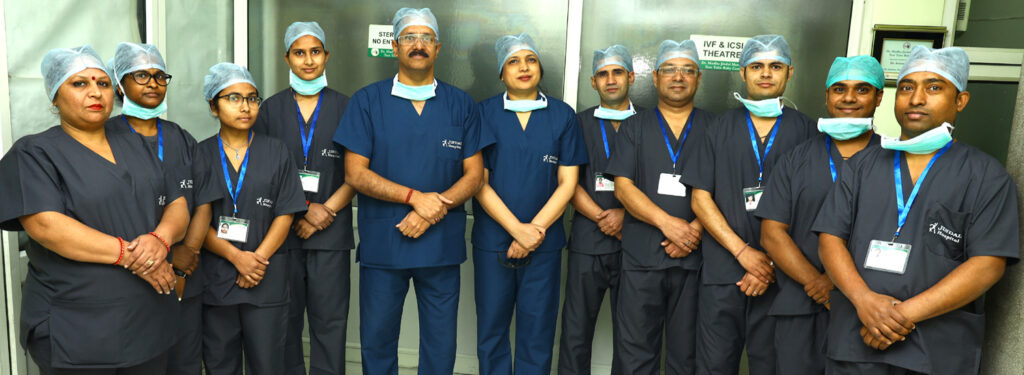
Laproscopy
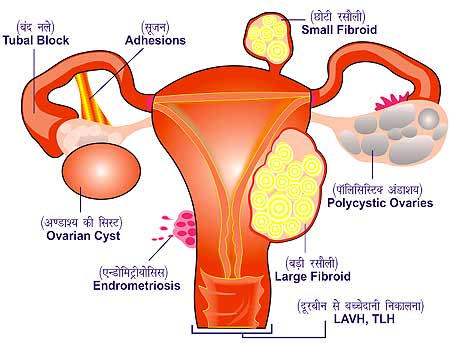
Minimally Invasive or Keyhole surgery is a modern technique to cure many problems in the human body that require surgery or operation. The technique uses 2 to 4 small holes of 2.7 to 10 mm diameter, in the abdomen to perform the operation on the body parts inside. No large cuts need to be made on the body as in earlier days that would not only be painful, take days to heal and in the end leave ugly scars.
The magic stick used to perform minimally invasive surgeries is called the Laparoscope. an instrument that is inserted into the body through a small hole. Once inside, the laparoscope does the magic. It lights the inside and has a camera that itself is tiny but magnifies tiny body parts into manifold magnifications that can be seen on a TV monitor by the surgeon. The laparoscope facilitates the artistic hands of the surgeon to perform the operation through highly specialized instruments that are sent inside the body through other keyholes.
Laparoscopic or Endosurgery procedures are simple, pain lesser, cost smaller, scar lesser and recover faster. The way most operations are now being done using laparoscopy, the saying in medical circles goes – “A doctor without a scope has no scope.
Indications
- Diagnostic
- Adhesiolysis
- Salpinog-ovariolysis
- Fimbrioplasty & Neosalpingostomy
- Tubal Block Recanalisation
- Ovarian Cysts
- Polycystic Ovarian Disease
- Fibroids and Endometriosis
- Laparoscopic Hysterectomy (LAVH, TLH)
Indications
- Diagnostic
- Intra Uterine Adhesions
- Endometrial Polyps
- Submucosal Fibroids
- Uterine Septum
- Tuba Cannulation
- Endometrial resection (TCRE)
Hysteroscopy
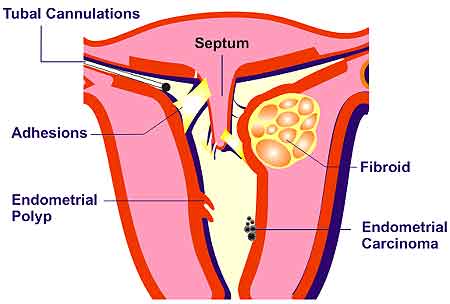
Endoscopy
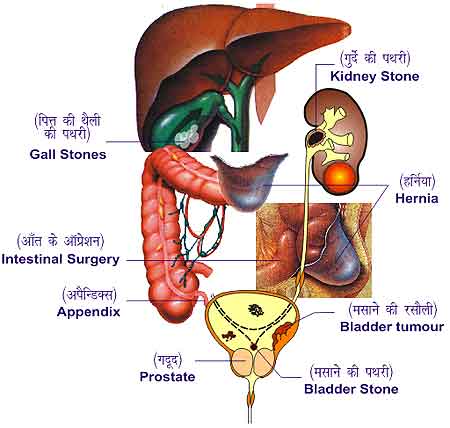
Indications
- Diagnostic
- Gall bladder Stones
- Apendicectomy
- Hernia Repair
- Bowel Surgery
- Spleen, Liver, Pancrease Surgery
- Kidney & Ureteric Stone Removal
- TUR for prostate, bladder growth
Gynaecology or gynecology (“the science of women”) refers to the surgical specialty dealing with health of the female reproductive system (uterus, vagina and ovaries). The main conditions dealt with by a gynaecologist are: Gynaecological oncology Urogynaecology Cancer and pre-cancerous diseases of the reproductive organs including ovaries, fallopian tubes, uterus, vagina, and vulva Incontinence of urine. Amenorrhea (absent menstrual periods) Dysmenorrhoea (painful menstrual periods) Infertility Menorrhagia (heavy menstrual periods). This is a common indication for hysterectomy. Prolapse of pelvic organs We offer a complete screening & treatment programme for all gynaecological related cancers including colposcopy, hysteroscopy, oncology surgery & chemotherapy.
Menopausal Clinic
A compressive programme to deal with all post menopausal women is available so that they are able to lead a healthy & wholesome life. Urogynaecology clinic – problems like stress incontinence is dealt with by medication, laparoscopy surgery.
Vaginal surgery
Gynaecological clinic- where menstrual problems like Incontinence of urine, Amenorrhea (absent menstrual periods) & Dysmenorrhoea (painful menstrual periods) are dealt with gynaecological surgical setup. We offer laparoscopic and non-laparoscopic gynaecological surgeries as well as vaginal surgeries with the best State of the Art system. We also offer cosmetic surgery including cosmetic vaginal surgeries like neo vaginoplasty
Gynecology
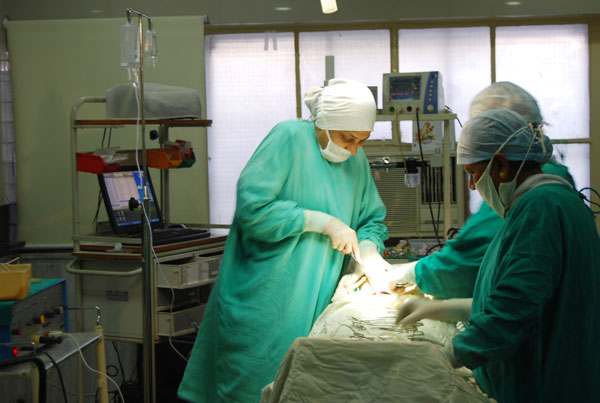
Obstetrics
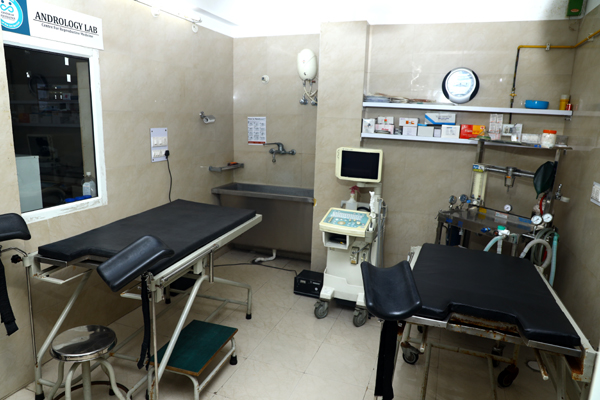
Obstetrics is the surgical speciality dealing with the care of a woman and her offspring during pregnancy, childbirth and the puerperium (the period shortly after birth). In obstetric practice, an obstetrician sees a pregnant woman on a regular basis to check the progress of the pregnancy, to verify the absence of ex-novo disease, to monitor the state of preexisting disease and its possible effect on the ongoing pregnancy.
The practicing OB/GYN to be adept at the surgical management of the entire scope of clinical pathology involving female reproductive organs, and to provide care for both pregnant and non-pregnant patients.
Maternity Clinic
Congratulations on your pregnancy We look forward to caring for you and hope you will have a happy and successful outcome to your pregnancy. If not pregnant than we are here for you with all advanced treatment options.
- Round the clock Obstetricians.
- Facilities for Sonography, Color Doppler & Cardiotocography.
- Compassionate post natal care
Medical sonography (ultrasonography) is an ultrasound-based diagnostic medical imaging technique used to visualize muscles, tendons, and many internal organs, their size, structure and any pathological lesions with real time tomographic images.
It is also used to visualize a fetus during routine and emergency prenatal care. Ultrasound scans are performed by medical health care professionals called sonographers. Obstetric sonography is commonly used during pregnancy.
Ultrasound and Color Doppler


General Surgical Unit
General surgery, despite its name, is a surgical specialty that focuses on abdominal organs, e.g. intestines including esophagus, stomach, small bowel, colon, liver, pancreas, gallbladder and bile ducts, and often the thyroid gland. They also deal with diseases involving the skin and hernias. These are includes:
ABDOMEN
- Abdominal Abscess
- Abdominal Angina
- Abdominal Hernias
- Acute Abdomen and Pregnancy
- Acute Mesenteric Ischemia
- Appendicitis
- Bariatric Surgery
- Benign Gastric Tumors
- Benign Neoplasm of the Small Intestine
- Bile Duct Tumors
- Cholecystocutaneous Fistula
- Chyle Fistula
- Decubitus Ulcers
- Gallbladder Mucocele
- Gallbladder Tumors
- Gallbladder Volvulus
- Gastric Outlet Obstruction
- Gastric Volvulus
- Hepatic Cysts
- Hepatocellular Carcinoma
- Inferior Vena Caval Thrombosis
- Intestinal Fistulas: Surgical Perspective
- Intestinal Perforation
- Lipomas
- Liver Abscess
- Meckel Diverticulum
- Mesenteric Artery Ischemia
- Mesenteric Artery Thrombosis
- Mesenteric Tumors
- Mesenteric Venous Thrombosis
- Omental Torsion
- Pancreatic Pseudoaneurysm
- Perforated Peptic Ulcer
- Peritonitis and Abdominal Sepsis
- Postcholecystectomy Syndrome
- Pyogenic Hepatic Abscesses
- Radiation Enteritis and Proctitis
- Short-Bowel Syndrome
- Solid Omental Tumors
- Splenic Abscess
- Splenic Infarct
- Temporary Abdominal Closure Techniques
- Upper Gastrointestinal Bleeding: Surgical Perspective
- Vermiform Appendix
- Zenker Diverticulum
COLORECTAL
- Anal Fissure
- Fistula-in-Ano
- Gardner Syndrome
- Hemorrhoids
- Lower Gastrointestinal Bleeding: Surgical Perspective
- Perianal Abscess
- Perianal Cysts
- Perianal Granuloma
- Pilonidal Disease
- Proctitis and Anusitis
- Pseudomembranous Colitis: Surgical Perspective
- Rectal Prolapse
- Rectovaginal Fistula
- Volvulus, Sigmoid and Cecal
GLANDS
- Hidradenitis Suppurativa
- Salivary Gland Tumors, Major, Benign
- Salivary Gland Tumors, Minor, Benign
HEAD AND NECK
- Perilymph Fistula
- Peritonsillar Abscess
LYMPHATIC SYSTEM
- Lymphedema
PERIPHERAL TISSUES
- Frostbite
THORAX
- Cystosarcoma Phyllodes
- Thymoma
WOUNDS
- Wound Care
- Wound Infection

